外研版(2019)必修第一册Unit 5 Into the wild Using language 课件 (共38张PPT)
文档属性
| 名称 | 外研版(2019)必修第一册Unit 5 Into the wild Using language 课件 (共38张PPT) | 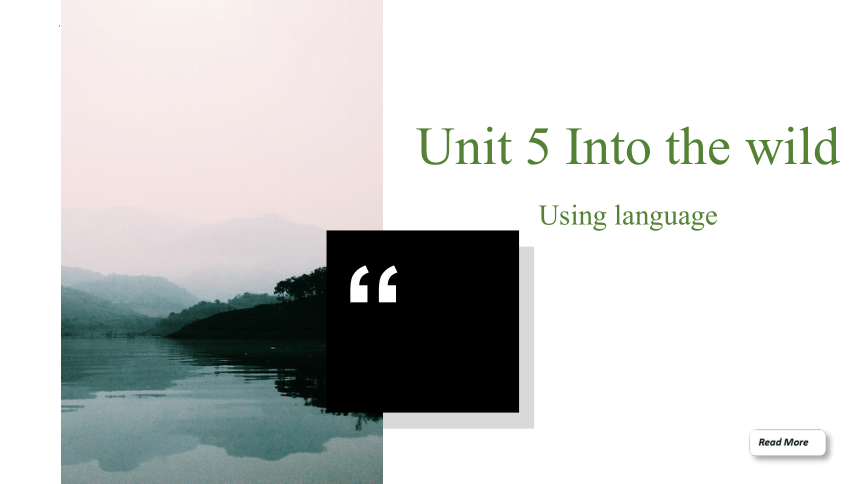 | |
| 格式 | pptx | ||
| 文件大小 | 3.6MB | ||
| 资源类型 | 教案 | ||
| 版本资源 | 外研版(2019) | ||
| 科目 | 英语 | ||
| 更新时间 | 2023-11-05 20:21:34 | ||
图片预览

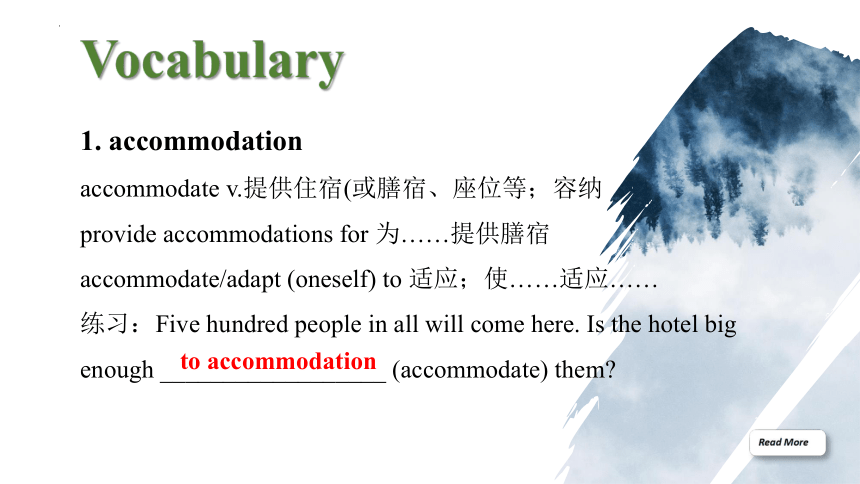



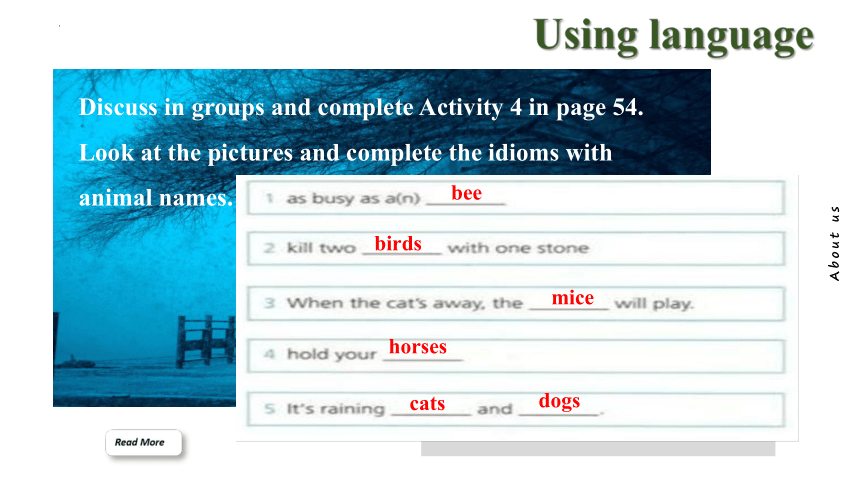
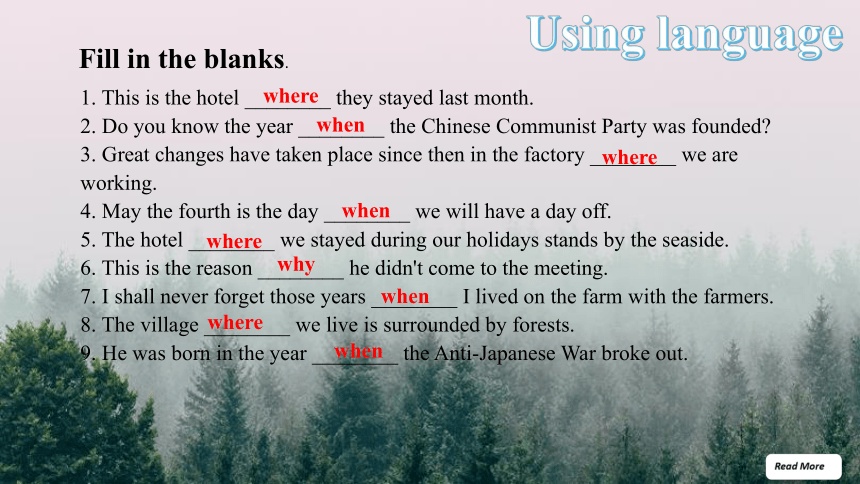


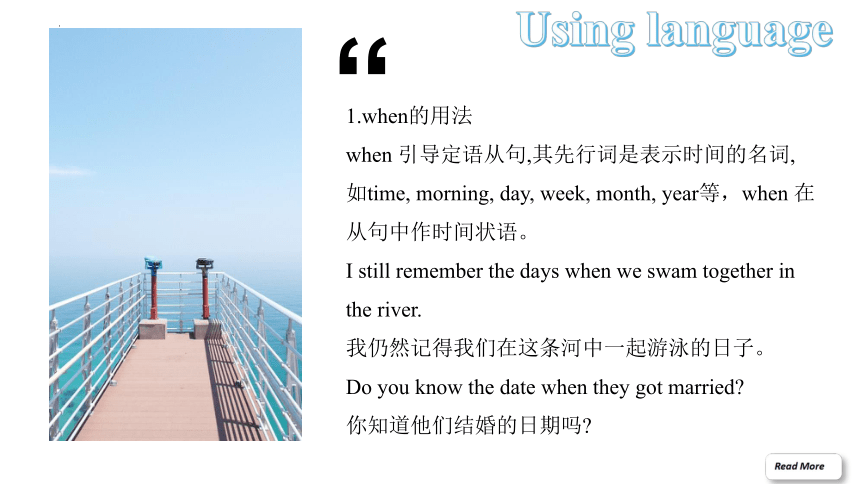
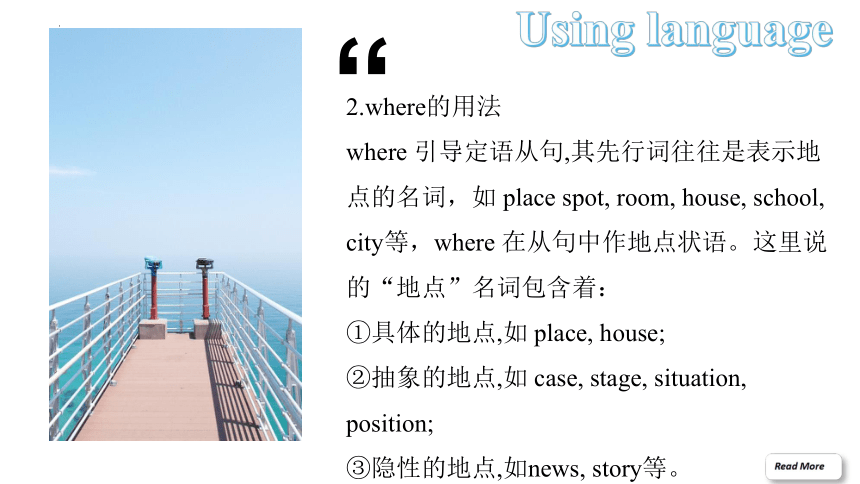
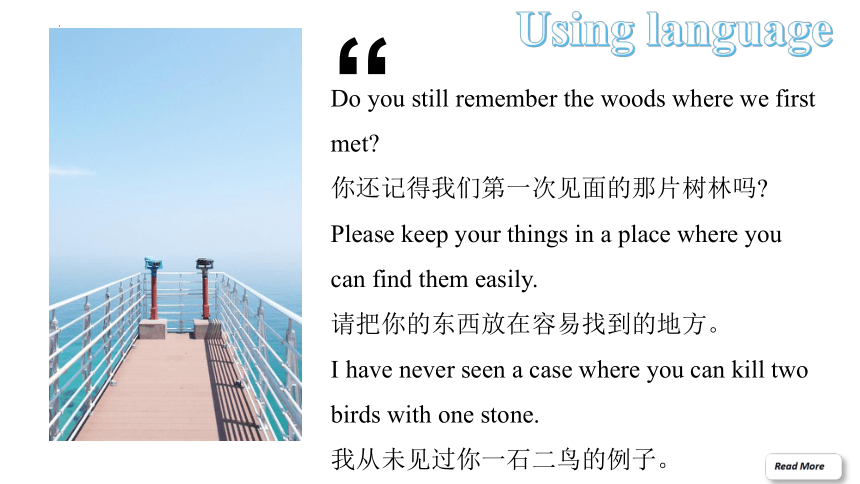
文档简介
(共38张PPT)
Read More
Unit 5 Into the wild
Using language
Read More
Vocabulary
1. accommodation
accommodate v.提供住宿(或膳宿、座位等;容纳
provide accommodations for 为……提供膳宿
accommodate/adapt (oneself) to 适应;使……适应……
练习:Five hundred people in all will come here. Is the hotel big enough __________________ (accommodate) them
to accommodation
Read More
Vocabulary
2. source
an energy source 能量来源
a source of power 动力来源
a source of enjoyment/strength 快乐/力量的源泉
the source ofthe Yellow River 黄河的源头
练习:Wind is now the world's fastest growing ____________ (动力来源).
source of power
Read More
Vocabulary
3. found
to be founded on sth. 建立在某事物的基础上
练习:Peking University _____________ (found) in 1898.
was founded
WELCOME
TO breath
About us
Read More
What do you know about animal idioms
Leading in
About us
Read More
Discuss in groups and complete Activity 4 in page 54.
Look at the pictures and complete the idioms with animal names.
Using language
bee
birds
mice
horses
cats
dogs
Read More
Using language
Fill in the blanks.
1. This is the hotel ________ they stayed last month.
2. Do you know the year ________ the Chinese Communist Party was founded
3. Great changes have taken place since then in the factory ________ we are working.
4. May the fourth is the day ________ we will have a day off.
5. The hotel ________ we stayed during our holidays stands by the seaside.
6. This is the reason ________ he didn't come to the meeting.
7. I shall never forget those years ________ I lived on the farm with the farmers.
8. The village ________ we live is surrounded by forests.
9. He was born in the year ________ the Anti-Japanese War broke out.
where
when
where
when
where
why
when
where
when
Read More
Using language
一、定语从句
关系副词的用法
被定语从句修饰的词叫作先行词;连接先行词与从句的词叫作关系词(包括关系代词和关系副词)。关系词不仅在先行词与定语从句之间起连接作用,而且也充当定语从句中的一个成分。
当引导定语从句的关系词在从句中作时间、地点、原因状语时,应使用关系副词 when, where, why。还有一个万能关系副词 that。
Read More
Using language
关系副词的作用如下:
(1)指代表示时间、地点、原因的先行词;
(2)在从句中充当句子成分——状语;
(3)起连接作用,把主句和定语从句连接起来
Read More
Using language
1.when的用法
when 引导定语从句,其先行词是表示时间的名词,如time, morning, day, week, month, year等,when 在从句中作时间状语。
I still remember the days when we swam together in the river.
我仍然记得我们在这条河中一起游泳的日子。
Do you know the date when they got married
你知道他们结婚的日期吗
Read More
Using language
2.where的用法
where 引导定语从句,其先行词往往是表示地点的名词,如 place spot, room, house, school, city等,where 在从句中作地点状语。这里说的“地点”名词包含着:
①具体的地点,如 place, house;
②抽象的地点,如 case, stage, situation, position;
③隐性的地点,如news, story等。
Read More
Using language
Do you still remember the woods where we first met
你还记得我们第一次见面的那片树林吗
Please keep your things in a place where you can find them easily.
请把你的东西放在容易找到的地方。
I have never seen a case where you can kill two birds with one stone.
我从未见过你一石二鸟的例子。
Read More
Using language
友情提示:并非所有的表示“地点”和“时间”的先行词,后面的定语从句一定要用where和when 引导。如果定语从句中缺少主语或宾语,那么,就要用that或which引导。
This is the house that/which Lu Xun once lived in. (作定语从句的宾语,不用where)
这是鲁迅曾住过的房子。
Do you still remember the days that/which we spent in the countryside
(作定语从句的宾语,不用when)
你还记得我们在农村度过的日子吗
Read More
Using language
3.why的用法
why 引导定语从句,表示原因或理由,其先行词是reason。why在定语从句中作原因状语。
Is this the reason why you refused me
这就是你拒绝我的理由吗
She came around to explain the reason why she was absent from the meeting.
她来这儿是为了解释她缺席这次会议的原因。
Read More
Using language
友情提示:
如果 reason 不是定语从句中事件发生的原因,定语从句中缺少主语或宾语,这时,要用关系代词that或which引导定语从句,不用why。
I won't listen to the reason that/which you have given us. (作定语从句的宾语)
我不听你给我们的那个理由。
Read More
Using language
4.关系副词that的用法
that 是一个多功能词也可以用作关系副词引导定语从句,修饰表示时间(time)、地点(place)、原因(reason方式(way)的先行词。that 作关系副词时,相当于when, where, why, in which,而且一般可以省略。
(1)表示时间时that相当于when或“介词+which”可省略。
I still remember the time (that/when/in which)I helped my father on the farm.
我仍然记得在农场里帮助我爸爸的岁月。
Read More
Using language
(2)表示地点时that相当于where或“介词+which”可省略。
I have never been to the place (that/where/in which) the Indians live.
我从未到过那些印第安人居住的地方。
(3)表示原因时that 相当于why或for which可省略。
The reason (that/why/for which) he lost his life was lack of medical care.
他的死是由于缺乏医疗护理。
(4)表示方式时,that相当于in which,可省略。
Can you work out a way (that/in which) we can solve this problem
你能找出一种我们能够解决这个问题的方法吗
Read More
Using language
关系代词与关系副词的选用
1.若从句的谓语动词是及物动词,后面若无宾语,用关系代动词词;是不及物动词则用关系副词。
2.若关系词在从句中作主语或宾语,则用关系代词;若作状语,则用关系副词
(1)This is the factory ( that/which)I visited last year.
(visit是及物动词,关系代词在从句中作宾语)
这是我去年参观过的那家工厂。
This is the factory where he used to work.
(work是不及物动词,关系副词在从句中作地点状语)
这是他以前工作过的那家工厂。
Read More
Using language
(2)Is this the museum that/which was built last year
(关系代词在从句中作主语)
这就是去年建成的那家博物馆吗
Is this the museum where the exhibition was held
这就是举办展览的那家博物馆吗
(关系副词在从句中作地点状语)
Read More
Using language
(3)Is this the reason (that/which ) he explained for being late
(关系代词在从句中作宾语)
这就是他解释的迟到的原因吗
Is this the reason why he was late for class
(关系副词在从句中作原因状语)
这就是他上课迟到的原因吗
Read More
Using language
(4)This is the house where my grandfather lived.(关系副词在从句中作地点状语)
这是我祖父住过的房子。
This is the house (that/which) my grandfather lived in.(关系代词在从句中作介词宾语)
这是我祖父住过的房子。
This is the house in which my grandfather lived.(关系代词在从句中作介词宾语)
这是我祖父住过的房子。
This is the house(that/which)my grandfather built.(关系代词在从句中作及物动词的宾语)
这是我祖父建造的房子。
This is the house that/which was built by my grandfather.(关系代词在从句中作主语)
这是由我祖父建造的房子。
Read More
Using language
限制性定语从句与非限制性定语从句
1.限制性定语从句
限制性定语从句用来修饰和限制先行词,与主句的关系非常密切,不用逗号和主句隔开。它说明先行词的性质.身份、特征等状况;如果去掉,就会影响句子意思的完整。
The doctor is a person who looks after people's health.
医生就是负责人们健康的人。
Read More
Using language
This is the school where Tom studied.
这就是汤姆学习过的学校。
I still remember the time when I first traveled by plane.
我仍然记得第一次坐飞机旅行的时候。
This is the diamond ring (that/which) she referred to.
这就是她提到过的那枚钻石戒指。
Read More
Using language
2.非限制性定语从句
非限制性定语从句,顾名思义,就是对先行词没有特别限制的定语从句。除了that 和why 不能引导之外,所有其他关系词如who, whom, which, whose, as, when, where等均可引导。
(1)非限制性定语从句的特点
非限制性定语从句与主句的关系不像限制性定语从句那样紧密,只是对先行词作些附加说明,即使去掉,主句的意思依然清楚完整。它与主句之间通常用逗号分开。翻译时常常不译作定语,而是译成与主句并列的句子,或者状语从句。
Read More
Using language
Last night I saw a very good film, which was about the Second World War.
昨晚我看了一部非常好的电影,是关于第二次世界大战的。
My parents live in my hometown, which is about 30 kilometres from here.
我的父母住在我的家乡,离这里大约30千米。
Milla, who is a distant relative of mine, studies in the Yale University now.
米拉是我的一位远房亲戚,她现在在耶鲁大学学习。
The house, where a murder case happened last year, has got a lovely garden.
那栋房子有一个漂亮的花园,去年那里发生过一起谋杀案。
Read More
Using language
(2)非限制性定语从句的使用情况
①当关系代词指代整个主句内容时,用非限制性定语从句(用which或as引导)。
The boy was badly ill, which worried his parents very much.
那个男孩病得很厉害,这让他的父母很担心。
The heavy rain lasted for half a month, which caused the flood.
大雨持续了半个月,引起了水灾。
The film is very instructive, as most audience say.
正如大多数观众所说,这部电影很有教育意义。
Read More
Using language
②当先行词指的是世界上独一无二的事物或专有名词时用非限制性定语从句。
The moon, which is about 384,400 kilometres away from the earth, creates many beautiful stories.
离地球约384400 千米远的月球,引发了很多美好的故事。
We all respect Albert Einstein, who is a great physicist in the world.
我们都尊敬阿尔伯特·爱因斯坦,他是世界上伟大的物理学家。
Read More
Using language
③先行词指某人的亲属,具有唯一性和确认性时,如son, daughter, father, mother, wife等,用非限制性定语从句。
My father, who is an excellent violinist, is leaving for Canada for performances.
我爸爸是一名出色的小提琴手。他正准备去加拿大演出。
Read More
Using language
④当引导定语从句的关系代词前有some/many/few/a few/little/a little/none /much /most/half of等时,多用非限制性定语从句。
I know three foreign teachers, two of whom are from Canada.
我认识三名外国老师,其中两名来自加拿大。
He earns only 1,200 yuan a month, half of which is given to his son at college.
他一个月仅赚 1200元,其中一半给他上大学的儿子。
There is too much information on the Internet, some of which is unreliable.
因特网上信息太多,其中一些不可靠。
Read More
Using language
区别 限制性定语从句 非限制性定语从句
与整个句子的关系 密切;若去掉会影响句子意义的完整性 松散;只是补充说明,去掉后不影响句子意义的表达
逗号的运用 不用逗号 一般用逗号
that和why 可用that或why 不可用that或why
which和who在从句中作宾语时可否省略 可省略 不可省略
whom在从句中作宾语时可否用that或 who替代 可替代 不可替代
可否修饰整个句子 不可 可修饰整个句子,用逗号隔开,由which或as引导
翻译时的区别 常译作定语 常译为并列句或按状语从句翻译
3.限制性定语从句与非限制性定语从句的区别
Read More
Using language
4.as与which引导的非限制性定语从句的区别
关系代词as与which引导的非限制性定语从句,其先行词都可以是整个主句,指代整个主句的意思。但as和which具有不同的词义句法和用法。
(1)as引导的从句表示说话人的看法、态度解释或评论。
引导定语从句时,as仍具有“正如,像,由······可知”等意思,翻译时有时可不必译出。as引导的定语从句常含有这些动词:see, know, hear, watch, remember, say, tell, show, expect, guess等。这类动词与as连用几乎成了一种固定搭配。as引导的此类从句可以置于句首、句中或句尾。
Read More
Using language
There is a net bar around here, as I remember.
我记得这儿附近有一家网吧。
As is often the case, girls like dolls while boys like guns.
女孩子喜欢玩偶而男孩子喜欢枪,这是常见的情况。
Read More
Using language
(2)which引导的从句对主所叙述的事情进行补充说明表明事物的状态或结果
which此时指前面主所提到的这件事,常译为“这一点,这件事”等。这时它所引导的从句与主句之间常含有并列因果关系。注意它引导的从句不像as那样位置灵活它只能位于主句的后面。
He found a solution to this mystery, which (= and it) made us all excited.
他找到了此谜的一个解决方案,这让我们大家都很兴奋。
She tore up my photos , which(= and it)upset me.
她撕碎了我的照片,这使我很难过。
Read More
Using language
(3)在从句中作定语或介词的宾语时要用which。
Jenny might come, in which case I'll ask her.
珍妮可能会来,要是那样的话我就去问她。
She graduated from a local middle school, after which she went to Peking University.
她毕业于当地的一所中学,之后她去了北京大学。
Read More
Using language
(4)当从句的谓语动词是否定形式或含着一个复合宾语时一般用which而不用as。
He pretended not to know me, which I didn't understand.
他假装不认识我,这是我搞不明白的。
He admires everyone in his class , which I find quite strange.
他美慕他班里的每个人,我觉得太奇怪了。
Read More
Using language
Discuss in groups and Fill in the blanks.
Isaac Asimov(艾萨克·阿西莫夫)was an American scientist and writer, His life began in Russia, 1.________ he was born on 2 January,1920. It ended in New York on 6, April,1992,2.________ he died as a result of an HIV infection that he had got from a blood transfusion nine years earlier.
When Asimov was three, he moved with his parents and his sister to New York City, 3.________ his parents bought a candy store which they ran for the next 40 or so years. At the age of nine, 4.________ his mother was pregnant with her third child, he started working part-time in the store.
where
when
where
when
Read More
Using language
When Asimov was eleven years old, his talent for writing became obvious. He had told a friend two chapters of a story he had written. The friend thought he was retelling a story from a book, 5.________ really surprised Asimov. From that moment, he saw no reason 6.________ he shouldn't take himself seriously as a writer. Asimov, 7.________ stories began to be published in science fiction magazines in 1939, published his first you novel in 1950 and his first science book in 1953.
which
why
whose
Thank you
Read More
Unit 5 Into the wild
Using language
Read More
Vocabulary
1. accommodation
accommodate v.提供住宿(或膳宿、座位等;容纳
provide accommodations for 为……提供膳宿
accommodate/adapt (oneself) to 适应;使……适应……
练习:Five hundred people in all will come here. Is the hotel big enough __________________ (accommodate) them
to accommodation
Read More
Vocabulary
2. source
an energy source 能量来源
a source of power 动力来源
a source of enjoyment/strength 快乐/力量的源泉
the source ofthe Yellow River 黄河的源头
练习:Wind is now the world's fastest growing ____________ (动力来源).
source of power
Read More
Vocabulary
3. found
to be founded on sth. 建立在某事物的基础上
练习:Peking University _____________ (found) in 1898.
was founded
WELCOME
TO breath
About us
Read More
What do you know about animal idioms
Leading in
About us
Read More
Discuss in groups and complete Activity 4 in page 54.
Look at the pictures and complete the idioms with animal names.
Using language
bee
birds
mice
horses
cats
dogs
Read More
Using language
Fill in the blanks.
1. This is the hotel ________ they stayed last month.
2. Do you know the year ________ the Chinese Communist Party was founded
3. Great changes have taken place since then in the factory ________ we are working.
4. May the fourth is the day ________ we will have a day off.
5. The hotel ________ we stayed during our holidays stands by the seaside.
6. This is the reason ________ he didn't come to the meeting.
7. I shall never forget those years ________ I lived on the farm with the farmers.
8. The village ________ we live is surrounded by forests.
9. He was born in the year ________ the Anti-Japanese War broke out.
where
when
where
when
where
why
when
where
when
Read More
Using language
一、定语从句
关系副词的用法
被定语从句修饰的词叫作先行词;连接先行词与从句的词叫作关系词(包括关系代词和关系副词)。关系词不仅在先行词与定语从句之间起连接作用,而且也充当定语从句中的一个成分。
当引导定语从句的关系词在从句中作时间、地点、原因状语时,应使用关系副词 when, where, why。还有一个万能关系副词 that。
Read More
Using language
关系副词的作用如下:
(1)指代表示时间、地点、原因的先行词;
(2)在从句中充当句子成分——状语;
(3)起连接作用,把主句和定语从句连接起来
Read More
Using language
1.when的用法
when 引导定语从句,其先行词是表示时间的名词,如time, morning, day, week, month, year等,when 在从句中作时间状语。
I still remember the days when we swam together in the river.
我仍然记得我们在这条河中一起游泳的日子。
Do you know the date when they got married
你知道他们结婚的日期吗
Read More
Using language
2.where的用法
where 引导定语从句,其先行词往往是表示地点的名词,如 place spot, room, house, school, city等,where 在从句中作地点状语。这里说的“地点”名词包含着:
①具体的地点,如 place, house;
②抽象的地点,如 case, stage, situation, position;
③隐性的地点,如news, story等。
Read More
Using language
Do you still remember the woods where we first met
你还记得我们第一次见面的那片树林吗
Please keep your things in a place where you can find them easily.
请把你的东西放在容易找到的地方。
I have never seen a case where you can kill two birds with one stone.
我从未见过你一石二鸟的例子。
Read More
Using language
友情提示:并非所有的表示“地点”和“时间”的先行词,后面的定语从句一定要用where和when 引导。如果定语从句中缺少主语或宾语,那么,就要用that或which引导。
This is the house that/which Lu Xun once lived in. (作定语从句的宾语,不用where)
这是鲁迅曾住过的房子。
Do you still remember the days that/which we spent in the countryside
(作定语从句的宾语,不用when)
你还记得我们在农村度过的日子吗
Read More
Using language
3.why的用法
why 引导定语从句,表示原因或理由,其先行词是reason。why在定语从句中作原因状语。
Is this the reason why you refused me
这就是你拒绝我的理由吗
She came around to explain the reason why she was absent from the meeting.
她来这儿是为了解释她缺席这次会议的原因。
Read More
Using language
友情提示:
如果 reason 不是定语从句中事件发生的原因,定语从句中缺少主语或宾语,这时,要用关系代词that或which引导定语从句,不用why。
I won't listen to the reason that/which you have given us. (作定语从句的宾语)
我不听你给我们的那个理由。
Read More
Using language
4.关系副词that的用法
that 是一个多功能词也可以用作关系副词引导定语从句,修饰表示时间(time)、地点(place)、原因(reason方式(way)的先行词。that 作关系副词时,相当于when, where, why, in which,而且一般可以省略。
(1)表示时间时that相当于when或“介词+which”可省略。
I still remember the time (that/when/in which)I helped my father on the farm.
我仍然记得在农场里帮助我爸爸的岁月。
Read More
Using language
(2)表示地点时that相当于where或“介词+which”可省略。
I have never been to the place (that/where/in which) the Indians live.
我从未到过那些印第安人居住的地方。
(3)表示原因时that 相当于why或for which可省略。
The reason (that/why/for which) he lost his life was lack of medical care.
他的死是由于缺乏医疗护理。
(4)表示方式时,that相当于in which,可省略。
Can you work out a way (that/in which) we can solve this problem
你能找出一种我们能够解决这个问题的方法吗
Read More
Using language
关系代词与关系副词的选用
1.若从句的谓语动词是及物动词,后面若无宾语,用关系代动词词;是不及物动词则用关系副词。
2.若关系词在从句中作主语或宾语,则用关系代词;若作状语,则用关系副词
(1)This is the factory ( that/which)I visited last year.
(visit是及物动词,关系代词在从句中作宾语)
这是我去年参观过的那家工厂。
This is the factory where he used to work.
(work是不及物动词,关系副词在从句中作地点状语)
这是他以前工作过的那家工厂。
Read More
Using language
(2)Is this the museum that/which was built last year
(关系代词在从句中作主语)
这就是去年建成的那家博物馆吗
Is this the museum where the exhibition was held
这就是举办展览的那家博物馆吗
(关系副词在从句中作地点状语)
Read More
Using language
(3)Is this the reason (that/which ) he explained for being late
(关系代词在从句中作宾语)
这就是他解释的迟到的原因吗
Is this the reason why he was late for class
(关系副词在从句中作原因状语)
这就是他上课迟到的原因吗
Read More
Using language
(4)This is the house where my grandfather lived.(关系副词在从句中作地点状语)
这是我祖父住过的房子。
This is the house (that/which) my grandfather lived in.(关系代词在从句中作介词宾语)
这是我祖父住过的房子。
This is the house in which my grandfather lived.(关系代词在从句中作介词宾语)
这是我祖父住过的房子。
This is the house(that/which)my grandfather built.(关系代词在从句中作及物动词的宾语)
这是我祖父建造的房子。
This is the house that/which was built by my grandfather.(关系代词在从句中作主语)
这是由我祖父建造的房子。
Read More
Using language
限制性定语从句与非限制性定语从句
1.限制性定语从句
限制性定语从句用来修饰和限制先行词,与主句的关系非常密切,不用逗号和主句隔开。它说明先行词的性质.身份、特征等状况;如果去掉,就会影响句子意思的完整。
The doctor is a person who looks after people's health.
医生就是负责人们健康的人。
Read More
Using language
This is the school where Tom studied.
这就是汤姆学习过的学校。
I still remember the time when I first traveled by plane.
我仍然记得第一次坐飞机旅行的时候。
This is the diamond ring (that/which) she referred to.
这就是她提到过的那枚钻石戒指。
Read More
Using language
2.非限制性定语从句
非限制性定语从句,顾名思义,就是对先行词没有特别限制的定语从句。除了that 和why 不能引导之外,所有其他关系词如who, whom, which, whose, as, when, where等均可引导。
(1)非限制性定语从句的特点
非限制性定语从句与主句的关系不像限制性定语从句那样紧密,只是对先行词作些附加说明,即使去掉,主句的意思依然清楚完整。它与主句之间通常用逗号分开。翻译时常常不译作定语,而是译成与主句并列的句子,或者状语从句。
Read More
Using language
Last night I saw a very good film, which was about the Second World War.
昨晚我看了一部非常好的电影,是关于第二次世界大战的。
My parents live in my hometown, which is about 30 kilometres from here.
我的父母住在我的家乡,离这里大约30千米。
Milla, who is a distant relative of mine, studies in the Yale University now.
米拉是我的一位远房亲戚,她现在在耶鲁大学学习。
The house, where a murder case happened last year, has got a lovely garden.
那栋房子有一个漂亮的花园,去年那里发生过一起谋杀案。
Read More
Using language
(2)非限制性定语从句的使用情况
①当关系代词指代整个主句内容时,用非限制性定语从句(用which或as引导)。
The boy was badly ill, which worried his parents very much.
那个男孩病得很厉害,这让他的父母很担心。
The heavy rain lasted for half a month, which caused the flood.
大雨持续了半个月,引起了水灾。
The film is very instructive, as most audience say.
正如大多数观众所说,这部电影很有教育意义。
Read More
Using language
②当先行词指的是世界上独一无二的事物或专有名词时用非限制性定语从句。
The moon, which is about 384,400 kilometres away from the earth, creates many beautiful stories.
离地球约384400 千米远的月球,引发了很多美好的故事。
We all respect Albert Einstein, who is a great physicist in the world.
我们都尊敬阿尔伯特·爱因斯坦,他是世界上伟大的物理学家。
Read More
Using language
③先行词指某人的亲属,具有唯一性和确认性时,如son, daughter, father, mother, wife等,用非限制性定语从句。
My father, who is an excellent violinist, is leaving for Canada for performances.
我爸爸是一名出色的小提琴手。他正准备去加拿大演出。
Read More
Using language
④当引导定语从句的关系代词前有some/many/few/a few/little/a little/none /much /most/half of等时,多用非限制性定语从句。
I know three foreign teachers, two of whom are from Canada.
我认识三名外国老师,其中两名来自加拿大。
He earns only 1,200 yuan a month, half of which is given to his son at college.
他一个月仅赚 1200元,其中一半给他上大学的儿子。
There is too much information on the Internet, some of which is unreliable.
因特网上信息太多,其中一些不可靠。
Read More
Using language
区别 限制性定语从句 非限制性定语从句
与整个句子的关系 密切;若去掉会影响句子意义的完整性 松散;只是补充说明,去掉后不影响句子意义的表达
逗号的运用 不用逗号 一般用逗号
that和why 可用that或why 不可用that或why
which和who在从句中作宾语时可否省略 可省略 不可省略
whom在从句中作宾语时可否用that或 who替代 可替代 不可替代
可否修饰整个句子 不可 可修饰整个句子,用逗号隔开,由which或as引导
翻译时的区别 常译作定语 常译为并列句或按状语从句翻译
3.限制性定语从句与非限制性定语从句的区别
Read More
Using language
4.as与which引导的非限制性定语从句的区别
关系代词as与which引导的非限制性定语从句,其先行词都可以是整个主句,指代整个主句的意思。但as和which具有不同的词义句法和用法。
(1)as引导的从句表示说话人的看法、态度解释或评论。
引导定语从句时,as仍具有“正如,像,由······可知”等意思,翻译时有时可不必译出。as引导的定语从句常含有这些动词:see, know, hear, watch, remember, say, tell, show, expect, guess等。这类动词与as连用几乎成了一种固定搭配。as引导的此类从句可以置于句首、句中或句尾。
Read More
Using language
There is a net bar around here, as I remember.
我记得这儿附近有一家网吧。
As is often the case, girls like dolls while boys like guns.
女孩子喜欢玩偶而男孩子喜欢枪,这是常见的情况。
Read More
Using language
(2)which引导的从句对主所叙述的事情进行补充说明表明事物的状态或结果
which此时指前面主所提到的这件事,常译为“这一点,这件事”等。这时它所引导的从句与主句之间常含有并列因果关系。注意它引导的从句不像as那样位置灵活它只能位于主句的后面。
He found a solution to this mystery, which (= and it) made us all excited.
他找到了此谜的一个解决方案,这让我们大家都很兴奋。
She tore up my photos , which(= and it)upset me.
她撕碎了我的照片,这使我很难过。
Read More
Using language
(3)在从句中作定语或介词的宾语时要用which。
Jenny might come, in which case I'll ask her.
珍妮可能会来,要是那样的话我就去问她。
She graduated from a local middle school, after which she went to Peking University.
她毕业于当地的一所中学,之后她去了北京大学。
Read More
Using language
(4)当从句的谓语动词是否定形式或含着一个复合宾语时一般用which而不用as。
He pretended not to know me, which I didn't understand.
他假装不认识我,这是我搞不明白的。
He admires everyone in his class , which I find quite strange.
他美慕他班里的每个人,我觉得太奇怪了。
Read More
Using language
Discuss in groups and Fill in the blanks.
Isaac Asimov(艾萨克·阿西莫夫)was an American scientist and writer, His life began in Russia, 1.________ he was born on 2 January,1920. It ended in New York on 6, April,1992,2.________ he died as a result of an HIV infection that he had got from a blood transfusion nine years earlier.
When Asimov was three, he moved with his parents and his sister to New York City, 3.________ his parents bought a candy store which they ran for the next 40 or so years. At the age of nine, 4.________ his mother was pregnant with her third child, he started working part-time in the store.
where
when
where
when
Read More
Using language
When Asimov was eleven years old, his talent for writing became obvious. He had told a friend two chapters of a story he had written. The friend thought he was retelling a story from a book, 5.________ really surprised Asimov. From that moment, he saw no reason 6.________ he shouldn't take himself seriously as a writer. Asimov, 7.________ stories began to be published in science fiction magazines in 1939, published his first you novel in 1950 and his first science book in 1953.
which
why
whose
Thank you
